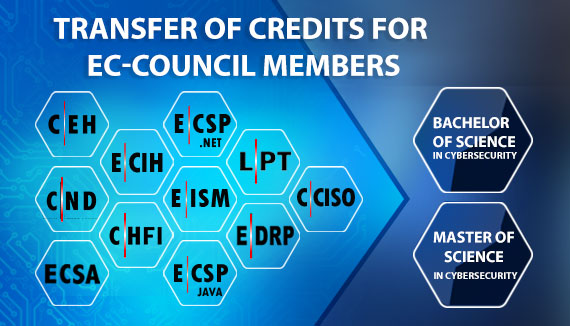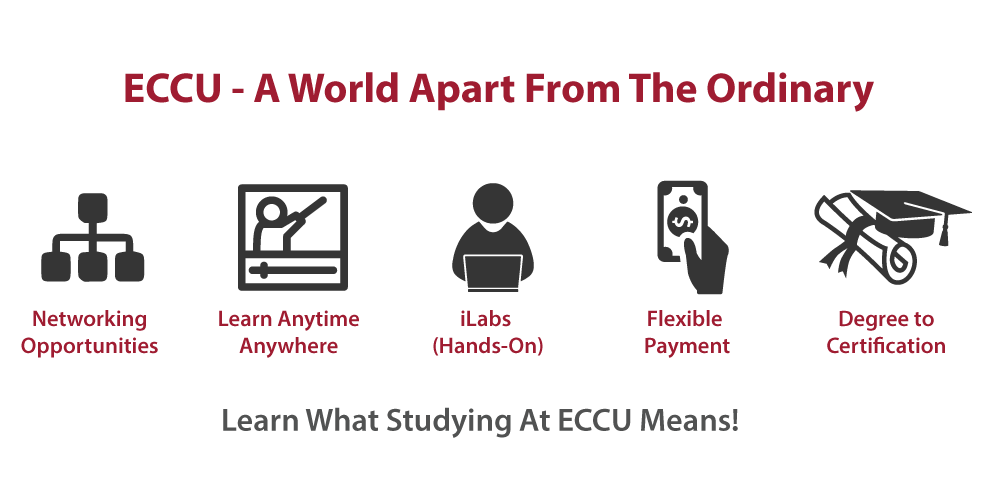
Overview
ECCU’s Master of Science in Cyber Security (MSCS) program prepares professionals to assume cybersecurity and information assurance leadership roles in corporations, agencies, and organizations. A curriculum rich in computer security management, IT security threat assessment, incident response, organizational management and behavior, and leadership challenges students to become creators of knowledge and inventors of processes.
The master’s in cybersecurity degree has been divided into a set of core courses that provide the necessary skills in cybersecurity, organizational behavior, and structure, research, and writing. The program then offers various specializations to allow students to select specific fields of study that they are passionate about, each having well-defined job prospects, derived from the NICE framework, affiliated with them.
The Master of Science in Cyber Security Program is offered 100% online, allowing students to complete coursework in a timeframe that fits their schedule. This also requires that the student has the appropriate technology and connectivity to sustain constant participation in class activities.
Program Summary
About the Program
Developed from a learning model based on Bloom’s Taxonomy, the online master’s in cybersecurity educational objectives are to identify what students should learn, understand, and be able to do based on their EC-Council University coursework.
The university’s bachelor and master in cybersecurity programs are established with a mix of both business management and applied practical technology studies. This is based on the industry’s need to have a balance of applied skills and disciplines in both technical domains of research and practical business knowledge in the workplace. The purely technical theory or heavily managerial focus of some programs does not produce as well-rounded a cybersecurity expert as is generally desired by industry.
What you will learn upon completion:
- The application of technical strategies, tools, and techniques to secure data and information for a client or customer.
- Adherence to a high standard of ethical behavior.
- The use of research in both established venues and innovative applications to expand the body of knowledge in cybersecurity.
- The application of critical thinking to creatively and systematically solve the problems and meet the challenges of the ever-changing environments of cybersecurity.
- The mastery of the skills necessary to move into leadership roles in companies, agencies, divisions, and departments.
Course Structure
The course structure of MS in cybersecurity is presented over 10-week terms and consists of assigned readings, threaded discussions, case studies, written analysis, research projects, and examinations.
Students must spend 10-12 hours of study a week to complete the work. ECCU encourages regular and frequent student-faculty interaction via the internet. Syllabi and grading rubrics of cybersecurity master’s degree set out the course requirements, expectations, and timelines, and students are kept abreast of their progress in the course through the MyECCU Online Learning Management System.
Course Delivery
ECCU’s Master of Science in Cyber Security coursework is delivered through a 100% online degree program, providing the flexibility of time management whereby students can attend to coursework at any time of day/night or weekends (24×7). There is a structure to the week and term whereby attendance and submissions must meet predefined deadlines each week and weekly attendance and participation are mandatory. Synchronous scheduled class times are not utilized, but adherence to discussion and homework weekly posting deadlines are.
The online master’s in cybersecurity degree utilize traditional university 10-week terms and are structured accordingly. The course delivery sits in a flexible middle ground between the structure of set class times and attendance and the open-ended system of self-paced independent study courses.
Each course under this Master of Science in Cyber Security program is instructor-led by credentialed professors with industry experience with a maximum enrollment of 30 students. Guided discussion, interaction/engagement, assistance/support, and grading/feedback will be done with your professor weekly as the course proceeds.
Courses typically consist of a mixture of weekly threaded discussions, reading materials, iLabs (ECCU’s online virtual platform to practice), presentation support (PowerPoint and/or video), quizzes/exams, and/or research projects/papers.
Candidates who wish to pursue ECCU’s master’s in cybersecurity online degree can choose one of its five specializations – Security Analyst, Cloud Security Architect, Digital Forensics, Incident Management, and Business Continuity and Executive Leadership in Information Assurance
Virtual Labs
100% Virtualization for a Complete Learning Experience!
iLabs was built for you. Whether you’re a beginner or an expert, iLabs is entirely customizable to your needs. No experience necessary!
Practical hands-on learning provides access to real-world tools and scenarios, boosts knowledge retention, and is proven to be more effective at preparing you for the job!
Admission Requirements
Applicants for admission must have a Bachelor’s degree from an accredited institution and a TOEFL score of 550 or better (or proof of English competency).
For more information about admission requirements, please visit our Admission page.
- Student Enrollment Application.
- Official government ID or passport (international students).
- A photo of yourself holding your official government ID.
- Official transcript(s) from the institution where the student received bachelor’s degree or most recent master’s degree.
- An official evaluation of international credits (for students with international transcripts only).
- Proof of English proficiency (international students only; see the section on English Requirement for International Students).
- Application fee.
Graduation Requirements
EC-Council University will award the Master of Science in Cybersecurity degree upon successful completion of all degree requirements.
In addition to the specific degree requirements, each candidate for graduation must meet the following requirements:
- Completion of thirty-six (36) credits of 500 level courses in which the candidate earned a cumulative GPA of 3.0 or better.
- Satisfactory completion of the summative capstone course.
- All degree requirements must be completed within one and a half times the program length or have a cumulative course completion rate of 67% of coursework from the date the student enrolls in the university and begins the MS in Information Security program
7 Industry Certifications Included in the Programs!
| Certifications | Master’ Degree Courses |
ECCU Student Price |
 |
ECCU 500 Managing Secure Network Systems |
Included in the Program |
 |
ECCU 501 Ethical Hacking & Countermeasures |
Included in the Program |
 |
ECCU 502 Investigating Network Intrusions and Computer Forensics |
Included in the Program |
| ECCU 503 Security Analysis and Vulnerability Assessment |
Included in the Program | |
| ECCU 506 Conducting Penetration and Security Tests |
Exam Fee: $800 iLab Fee: $200 |
|
 |
ECCU 513 Disaster Recovery |
Included in the Program |
| ECCU 522 Incident Handling and Response |
Included in the Program | |
 |
ECCU 523 Executive Information Security Management |
Included in the Program |
 |
ECCU 523 Executive Governance and Management |
Exam Fee: $999 |
Pricing
Tuition and Fees |
|
$540 /Per Credit Hour |
| Application Fee: $65 (One Time) |
| Technology Fee: $50 per term |
| Graduation Fee: $150 (One Time) |
| Transcript fee: $10+Shipping** |
| Transcript w/Apostille: $20+Shipping** |
| iLabs Fee: $200 |
| Specialization: Security Analyst Exam Fee: $800; iLab Fee: $200 |
| Specialization: Executive Leadership in Information Assurance Exam Fee: $999 |
The ECCU Governing Board has defined the regions. Student tuition rates are based on their official government photo ID that was submitted with the student admission application to determine the student’s region.
Transfer of Credits
As a prospective EC-Council University student and current industry-recognized certification holder, you can also earn credits toward your cybersecurity courses based on your prior learning/industry certifications.
Under the prior learning portfolio policy, ECCU for its cybersecurity master’s degree accepts certifications related to ethical hacking, penetration testing, network defense, digital forensics, incident handling, and much more.
Click here to read more about the EC-Council University Transfer of Credits program.

Apply For A Scholarship
Master of Science in Cyber Security Specializations
Security Analyst
The information Security Analyst specialization focuses on testing methods and techniques to effectively identify and mitigate risks to the security of a company’s infrastructure while providing application and network-based security vulnerability assessments, pen testing and securing wireless networks including authentication, authorization, and encryption in accordance with industry-accepted methods and protocols.
By specializing as an IT security analyst, you will be trained in various domains through specialized online ethical hacking and penetration testing courses. The average cybersecurity analyst salary, according to PayScale, is $75,883.


Cloud Security Architect
The Cloud Security Architect skills are focused on planning, analyzing, designing, configuring, testing, implementing, maintaining, and supporting an organization’s on-premise and cloud security infrastructure.
The Cloud Security Architect’s responsibilities include training to harden enterprise architecture and cloud architecture from the most advanced attacks and secure programming practices to overcome these inherent drawbacks to pre-empt bugs from the code and designing and implementing cloud security. The average cloud security architect salary, according to PayScale, is $123,642.
Digital Forensics
The Digital Forensic specialization focuses on demonstrating the required skill set of a Computer Forensic Investigator. Through this specialization, candidates who aspire to become digital forensics experts will learn the various aspects of digital forensics, including investigating network intrusions and mobile forensics. With a specialization in digital forensics , you would qualify as a Digital Forensic Investigator with the government at any level, as well as private industry––both on or leading an incident response team. The average digital forensics salary, according to PayScale, is $73,798.


Incident Management and Business Continuity
The Incident Management and Business Continuity specialization focuses on handling and responding to various security incidents, identifying vulnerabilities, and taking appropriate countermeasures to prevent information failure risks.
In this cybersecurity incident management and business continuity specialization, you will be trained on incident handling, disaster recovery, business continuity, and much more.
Executive Leadership in Information Assurance
The Executive Leadership in Information Assurance specialization focuses on providing the fundamental skills that are required to understand global leadership concepts, bringing together all the components required for a C-Level information security position, and providing students with the knowledge of how to manage IT security projects to enhance the success rate for both organizations and IT managers. This Executive Leadership program specialization mostly leads individuals to assume the position of CISO (and even CTO) at companies.
Executive Leadership training under information security master’s specialization includes global business leadership, executive governance and management, and project management in IT security.

FAQs
Ans. A master’s in cybersecurity degree paves the way for a candidate to enter the industry as a professional and secure an executive-level position. EC-Council University’s Master of Science in Cyber Security degree has been designed to train candidates and transform them into professionals to assume leadership roles in corporations, agencies, and organizations. Job roles that one can aim for with a cybersecurity master’s degree – Risk/Vulnerability Analyst/Manager, Information Security Analyst, Information Security Manager/Specialist, Chief Information Security Officer, among others.
Also read – What to do after you get a Master’s in Cyber Security?
Ans. Cybersecurity is amongst the most in-demand professions across the globe in 2020. A cybersecurity specialist has the responsibility of safeguarding a massive amount of private and sensitive data. Therefore, employees are willing to offer a hefty amount to candidates with the right skill set. According to PayScale, the average salary of a penetration tester in the United States is $83,968. Similarly, the average salary of a Software Security Engineer is $109,990.
Also read – Top 5 Cybersecurity Jobs of 2020
Ans. ECCU offers five specializations under its online master’s in cybersecurity program. Aspirants who wish to pursue this degree can choose one from – MSCS in Security Analyst, MSCS in Cloud Security Architect, MSCS in Digital Forensics, MSCS in Incident Management, and Business Continuity and MSCS in Executive Leadership in Information Assurance.
Ans. Cybersecurity is a continually growing industry. The rise in technological advancement and the parallel increase in the number of cyberattacks has made the need for cybersecurity specialists more vital. Getting an MS in cybersecurity can be worth it for candidates because of the growing demand for such professionals. With a master’s in cybersecurity online degree, candidates can fulfill the requirements of employers with the right skill set.
Also read – All about a master’s degree in cybersecurity
Fulfill your dream of becoming a Cybersecurity Leader.
Become a student at EC-Council University today!
Course Description
ECCU 505 Introduction to Research and Writing for the IT Practitioner
(3 Credits)
This foundational core course introduces students to basic English writing skills and research methods, including APA style writing, citing sources, determining when a website is credible, effective communication, outlines, and collaboration. Students will write/present portions of the above in the course in various formats.
MGMT 502 Business Essentials
(3 Credits)
This course will lay a broad foundation of understanding for global business principles for a varied population of students who work in businesses of all kinds, including the IT and IA fields. It covers the latest changes in Information Technology for Business, including computer-aided manufacturing (CAM), application software, and recent ethical issues arising from IT. Real-life business examples are added throughout the course that reinforce the business principles.
ECCU 504 Foundations of Organizational Behavior for the IT Practitioner
(3 Credits)
This foundational course deals with organizational behavior and allows the technology practitioner to experience the basic facets of organizational theory and define the skills required to understand and apply the theory to a real organizational setting. Elements of the course are organizational structure, effective communication, team building, ethics, and project management as seen through the organizational lens.
ECCU 516 The Hacker Mind: Profiling the IT Criminal
(3 Credits)
Cyberspace has increased human communication, connectivity, creativity, capacity and crime by leaps and bounds in the last decade. For all of the positive aspects it offers, it offers as many negative aspects. Those negative aspects are explored and developed by everyone from the high school challenge hacker to international terrorists. The IT criminal threatens businesses, governmental agencies, militaries, and organizations of every kind. This course will survey the spectrum of psychological attributes of the IT criminal.
ECCU 514 Quantum Leadership
(3 Credits)
This course encompasses an extensive research project about cross-cultural differences in leadership conducted by a group of researchers in 62 countries. It lays a foundation for understanding the process of leadership. The study describes the roles, functions, and impact of global leadership concepts. Many team exercises provide the speed at which leaders must work. Research and views into how most cultures respond to this area of management are provided.
ECCU 500 Managing Secure Network Systems
(3 Credits)
This course focuses on evaluating network and Internet security issues, designing and implementing successful security policies and firewall strategies, and exposing the system and network vulnerabilities and defending against them. Topics include network protocols, network attacks, intrusion detection systems, packet filtering and proxy servers, Bastion hosts and honey pots, hardening routers, hardening security, email security, virtual private networks, and creating fault tolerance.
ECCU 507 Linux Networking and Security
(3 Credits)
This course focuses on configuring a secure Linux network using the command line and graphical utilities. Emphasis is placed on file-sharing technologies such as the Network File System, NetWare’s NCP file sharing, and File Transfer Protocol. Additional topics include making data secure, user security, file security, and network intrusion detection. Students will be required to take on the role of problem solvers and apply the concepts presented to situations that might occur in a work environment.
ECCU 501 Ethical Hacking & Countermeasures
(3 Credits)
This course focuses on how perimeter defenses work, how intruders escalate privileges, and methods of securing systems. Additional topics include intrusion detection, policy creation, social engineering, DoS attacks, buffer overflows, and virus creation.
ECCU 503 Security Analysis and Vulnerability Assessment
(3 Credits)
This course focuses on testing methods and techniques to effectively identify and mitigate risks to the security of a company’s infrastructure. Topics include penetration testing methodologies, test planning and scheduling, information gathering, password-cracking penetration testing and security analysis, social-engineering penetration testing and security analysis, internal and external penetration testing and security analysis, router penetration testing and security analysis, and reporting and documentation.
ECCU 506 Conducting Penetration and Security Tests
(3 Credits)
This course focuses on the mastery of the international standard for penetration testing. Topics include customers and legal agreements, penetration testing planning and scheduling, information gathering, external and internal network penetration testing, router penetration testing, firewalls penetration testing, intrusion detection system penetration testing, wireless networks penetration testing, password-cracking penetration testing, social-engineering penetration testing, PDA and cell phone penetration testing, and penetration testing report and documentation writing.
ECCU 509 Securing Wireless Networks
(3 Credits)
This course focuses on the various methods of securing wireless networks including authentication, authorization, and encryption. Topics include radio frequency communications, infrared, Bluetooth, low-speed wireless local area networks, high-speed WLANs and WLAN security, digital cellular telephone, fixed wireless, and wireless communications in business.
ECCU 520: Advanced Network Defense
(3 Credits)
This course focuses on the fundamental areas of fortifying your defenses by discovering methods of developing a secure baseline and how to harden your enterprise architecture from the most advanced attacks. It provides segmentation and isolation to reduce the effectiveness of advanced persistent threats.
ECCU 524: Designing and Implementing Cloud Security
(3 Credits)
This course provides comprehensive knowledge of cloud services, their characteristics, benefits, applications, and service models. It covers planning, designing, and implementing cloud security controls. It delves into various cloud standards, countermeasures, and best practices to secure information in the cloud. The program also emphasizes the business aspects of cloud security such as cloud uptime, uptime guarantee, availability, fault tolerance, failover policy, and how cloud security strengthens the business case for cloud adoption.
ECCU 510 Secure Programming
(3 Credits)
This course provides the essential and fundamental skills for secure programming. The most prevalent reason behind buggy code and vulnerabilities being exploited by hackers and malicious code is the lack of adoption of secure coding practices. This program will ensure that students are exposed to the inherent security drawbacks in various programming languages or architectures. They will be exposed to exercise secure programming practices to overcome these inherent drawbacks to pre-empt bugs from the code.
ECCU 502 Investigating Network Intrusions and Computer Forensics
(3 Credits)
This course focuses on cyber-attack prevention, planning, detection, and incident response with the goals of counteracting cybercrime, cyber terrorism, and cyber predators, and making them accountable. Additional topics include fundamentals of computer forensics, forensic duplication and analysis, network surveillance, intrusion detection and response, incident response, anonymity, computer security policies and guidelines, and case studies.
ECCU 521: Advanced Mobile Forensics and Security
(3 Credits)
This course focuses on the intricacies of manual acquisition (physical vs. logical) and advanced analysis using reverse engineering to understand how popular Mobile OSs are hardened to defend against common attacks and exploits. Topics include mobile forensic challenges and process, mobile hardware design and architectures, OS architecture, boot process, file systems, threats and security, evidence acquisition and analysis, application reverse engineering, and mobile forensics reporting and expert testimony.
ECCU 517 Cyber Law
(3 Credits)
This course focuses on the legal issues affected by online criminal conduct, electronic evidence and the legal ramifications of neglecting trademarks, copyrights, patents, and digital rights. Topics include laws, regulations, and international standards; privacy laws governing law enforcement investigations in cyberspace; implications of cybercrimes upon the traditional notions of sovereignty; and current events that affect cyber laws. Prerequisite ECCU 505.
ECCU 522: Incident Handling and Response
(3 Credits)
This course addresses various underlying principles and techniques for detecting and responding to current and emerging computer security threats. Additional emphasis is placed on computer forensics and its role in handling and responding to incidents. Through this course, students will be proficient in handling and responding to various security incidents such as network security incidents, malicious code incidents, insider attack threats, incident response teams, incident management training methods, and incident recovery techniques in detail.
ECCU 513 Disaster Recovery
(3 Credits)
This course focuses on disaster recovery principles including assessment of risks to an enterprise, development of disaster recovery policies and procedures, the roles and relationships of various members of an organization, preparation of a disaster recovery plan, testing and rehearsal of the plan, implementation of the plan, and recovering from a disaster. Additional emphasis is placed on identifying vulnerabilities and taking appropriate countermeasures to prevent information failure risks.
ECCU 512 Beyond Business Continuity
(3 Credits)
Whether an organization has experienced a disaster, downsizing, a shift in culture, or a change in leadership, it will experience organizational change. This change demands remembering the past, finding ways to recover from it, engaging the future, and energizing change. Leaders in change must have the skills to identify, structure, forecast, envision, design, plan, implement, account for, and lead a team through change that has been strategically planned to advance the organization. Such a leader is a change agent and must understand the process, expectations, and nuances of change.
ECCU 511 Global Business Leadership
(3 Credits)
This course is designed to provide fundamental skills needed to understand global leadership concepts such as developing technological savvy, appreciating diversity, building partnerships, creating a shared vision, maintaining a competitive advantage, integrity, and leading for change. This is a study of current and historical leadership theories with an emphasis on viewing the leadership function in the context of global organizational behavior and organizational designs.
ECCU 523 – Executive Information Security Management/ Executive Governance and Management
(3 Credits)
This course is designed to bring together all the components required for a C-Level position by combining Governance, Security Risk Management, Controls, and Audit Management, Security Program Management and Operations, Information Security Core Concepts, Strategic Planning, Finance, and Vendor Management to lead a highly successful IS program.
ECCU 515 Project Management in IT Security
(3 Credits)
This class is designed to provide students with knowledge of how to manage IT security projects to enhance the success rate for both organizations and IT managers. It acts as an operational framework for users who design their own IT security project plan. The goal of PMITS is to help the students implement their IT project management skills by providing a road-map for implementing IT security in their organizations. It standardizes the knowledge base for business professionals by incorporating the best practices and legal standards related to corporate IT security.













